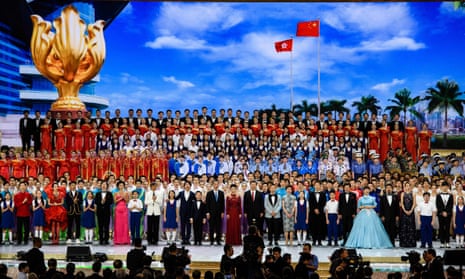China criticised the “incorrect” views of the foreign secretary, Boris Johnson, as a war of words broke out between London and Beijing on the eve of the 20th anniversary of Hong Kong’s return to China.
Johnson released on Thursday what had seemed a relatively restrained statement marking the anniversary of the former British colony’s transfer back to China on 1 July 1997.
In his statement, the foreign secretary made no direct criticism of Beijing but said: “As we look to the future, Britain hopes that Hong Kong will make more progress toward a fully democratic and accountable system of government.”
He said it was “vital” to Hong Kong’s continued success that its “high degree of autonomy and rule of law are preserved”.
Beijing, whose ambassador to London had previously warned Britain against criticising its actions in Hong Kong, appears to have taken exception to the intervention from Hong Kong’s former colonial masters.
Speaking to reporters in Beijing, the foreign ministry spokesperson Lu Kang attacked Johnson’s comment as “incorrect” and misplaced. “Hong Kong is a special administrative region of China, and therefore Hong Kong affairs are China’s internal affairs,” Lu said, according to Xinhua, China’s official news agency.
According to Xinhua, Lu said Hong Kong’s success “had already been proven during the 20 years since its return to China, and outsiders should not make incorrect remarks regarding that”.
Xinhua made it clear that Lu’s comments were made in direct response to Johnson’s statement and a more strongly worded US statement about “infringements of civil liberties [and] intrusions on press freedoms” in Hong Kong.
More controversially, Lu added that the joint declaration – the 1984 Sino-British deal that secured Britain’s departure from Hong Kong by guaranteeing that Hong Kong’s way of life would remain “unchanged” for 50 years – now had no “binding force”, a statement likely to alarm not just members of Hong Kong’s pro-democracy camp but also governments who do business with China.
“Since Hong Kong returned to the motherland 20 years ago, the declaration, as a historical document, no longer has any practical significance nor any binding force on the central government’s administration of Hong Kong,” Lu said, according to Xinhua.
Britain was quick to reject Beijing’s claims. According to Reuters, a foreign office spokeswoman said: “The Sino-British joint declaration remains as valid today as it did when it was signed over 30 years ago.”
“It is a legally binding treaty, registered with the UN and continues to be in force. As a co-signatory, the UK government is committed to monitoring its implementation closely.”
Members of Hong Kong’s democracy movement claim Britain has repeatedly failed to defend the former colony from Beijing’s erosion of its freedoms, including the suspected recent abduction of a British bookseller by Chinese agents.
In an interview on Thursday, one of Hong Kong’s most respected democracy activists Martin Lee said: “The British government is just awful. I’m afraid I cannot find any kind words to say about that.”
Last week, the former colony’s last governor, Chris Patten, told the Guardian Britain had demeaned itself by “kowtowing” to Beijing over issues such as Hong Kong and operated under the delusion that “unless you bow low enough you will never do any business in China”.
Speaking earlier in the week, Beijing’s ambassador to London, Liu Xiaoming, hinted that China’s friendship with the UK was conditional on Britain not challenging it over Hong Kong.
“I hope that all sectors in Britain will respect the fact that Hong Kong has returned to China,” Liu said, according to a video posted on Twitter by Xinhua.
“Hong Kong-related issues must be handled properly. I hope that by recognising and respecting the above we will continue to make Hong Kong a positive factor in China-UK relations. By recognising and respecting the above we will make sure that Hong Kong will continue to contribute positive energy to the ‘golden era’ of China UK relations.”
In an interview with the BBC, Lord Patten said Liu – who some tip as a possible future Chinese foreign minister – was “rather a bully” who “doesn’t know the difference between democracy and a wet haddock”.








